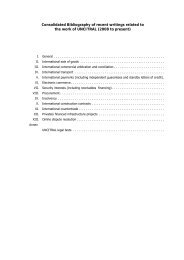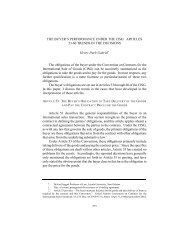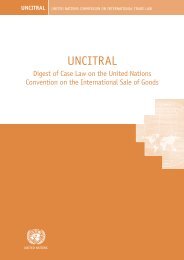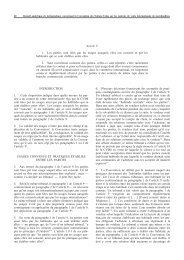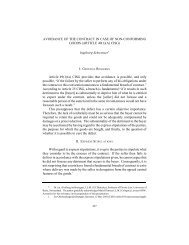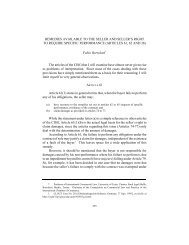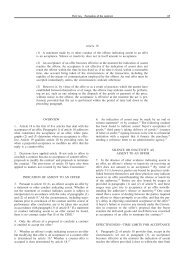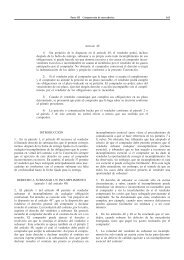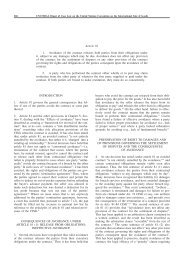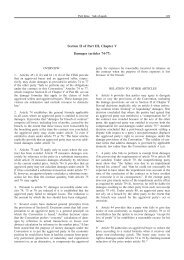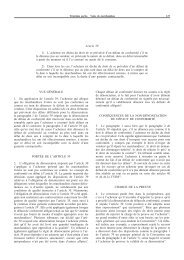Article 25 A breach of contract committed by one of the ... - uncitral
Article 25 A breach of contract committed by one of the ... - uncitral
Article 25 A breach of contract committed by one of the ... - uncitral
You also want an ePaper? Increase the reach of your titles
YUMPU automatically turns print PDFs into web optimized ePapers that Google loves.
Part three. Sale <strong>of</strong> goods 81<br />
6. As a rule late performance—whe<strong>the</strong>r late delivery <strong>of</strong> 8. Special problems arise when <strong>the</strong> goods are defective but<br />
<strong>the</strong> goods or late payment <strong>of</strong> <strong>the</strong> price—does not in itself repairable. Some courts have held that easy repairability precludes<br />
finding a fundamental <strong>breach</strong>. 23 Courts are reluctant to<br />
constitute a fundamental <strong>breach</strong> <strong>of</strong> <strong>contract</strong>. 12 Only when<br />
<strong>the</strong> time for performance is <strong>of</strong> essential importance ei<strong>the</strong>r consider a <strong>breach</strong> fundamental when <strong>the</strong> seller <strong>of</strong>fers and effects<br />
because it is so <strong>contract</strong>ed 13 or due to evident circumstances speedy repair without any inconvenience to <strong>the</strong> buyer. 24<br />
(e.g., seasonal goods) 14 does delay as such amount to a<br />
fundamental <strong>breach</strong>. 15 But even if a delay is not fundamental 9. The violation <strong>of</strong> o<strong>the</strong>r <strong>contract</strong>ual obligations can also<br />
<strong>breach</strong>, <strong>the</strong> Convention allows <strong>the</strong> aggrieved party to fix an amount to a fundamental <strong>breach</strong>. It is, however, necessary<br />
additional period <strong>of</strong> time for performance; if <strong>the</strong> party in that <strong>the</strong> <strong>breach</strong> deprive <strong>the</strong> aggrieved party <strong>of</strong> <strong>the</strong> main<br />
<strong>breach</strong> fails to perform during that period, <strong>the</strong> aggrieved benefit <strong>of</strong> <strong>the</strong> <strong>contract</strong> and that this result could have been<br />
party may <strong>the</strong>n declare <strong>the</strong> <strong>contract</strong> avoided (articles 49 (1) (b) foreseen <strong>by</strong> <strong>the</strong> o<strong>the</strong>r party. Thus, a court stated that <strong>the</strong>re<br />
and 64 (1) (b)). 16 Therefore in such a case, but only in is no fundamental <strong>breach</strong> in case <strong>of</strong> delivery <strong>of</strong> incorrect<br />
that case, <strong>the</strong> lapse <strong>of</strong> <strong>the</strong> additional period turns a nonfundamental<br />
delay in performance into a sufficient reason never<strong>the</strong>less merchantable or if <strong>the</strong> buyer itself could—at <strong>the</strong><br />
certificates pertaining to <strong>the</strong> goods if ei<strong>the</strong>r <strong>the</strong> goods were<br />
for avoidance.<br />
seller’s expense—easily acquire <strong>the</strong> correct certificates. <strong>25</strong> The<br />
unjustified denial <strong>of</strong> <strong>contract</strong> rights <strong>of</strong> <strong>the</strong> o<strong>the</strong>r party—e.g.,<br />
7. If defective goods are delivered, <strong>the</strong> buyer can avoid a refusal to recognize <strong>the</strong> validity <strong>of</strong> a retention <strong>of</strong> title clause<br />
<strong>the</strong> <strong>contract</strong> when <strong>the</strong> non-conformity <strong>of</strong> <strong>the</strong> goods is properly<br />
regarded as a fundamental <strong>breach</strong> <strong>of</strong> <strong>contract</strong> (article unjustified denial <strong>of</strong> a valid <strong>contract</strong> after having taken pos-<br />
and <strong>the</strong> seller’s right to possession <strong>of</strong> <strong>the</strong> goods, 26 or <strong>the</strong><br />
49 (1) (a)). It <strong>the</strong>refore is essential to know under what session <strong>of</strong> samples <strong>of</strong> <strong>the</strong> goods 27 —can amount to a fundamental<br />
<strong>breach</strong> <strong>of</strong> <strong>contract</strong>. The same is true when resale<br />
conditions delivery <strong>of</strong> non-conforming goods constitutes a<br />
fundamental <strong>breach</strong>. Court decisions on this point have restrictions have been substantially violated. 28<br />
found that a non-conformity concerning quality remains a<br />
mere non-fundamental <strong>breach</strong> <strong>of</strong> <strong>contract</strong> as long as <strong>the</strong> 10. A delay in accepting <strong>the</strong> goods will generally not<br />
buyer—without unreasonable inconvenience—can use <strong>the</strong> constitute a fundamental <strong>breach</strong>, particularly when <strong>the</strong><br />
goods or resell <strong>the</strong>m even at a discount. 17 For example, <strong>the</strong> delay is only for a few days. 29<br />
delivery <strong>of</strong> frozen meat that was too fat and too moist, and<br />
that consequently was worth <strong>25</strong>.5 per cent less than meat 11. The cumulation <strong>of</strong> violations <strong>of</strong> several <strong>contract</strong>ual<br />
<strong>of</strong> <strong>the</strong> <strong>contract</strong>ed quality (according to an expert opinion), obligations makes a fundamental <strong>breach</strong> more probable, but<br />
was not regarded as a fundamental <strong>breach</strong> <strong>of</strong> <strong>contract</strong> since does not automatically constitute a fundamental <strong>breach</strong>. 30<br />
<strong>the</strong> buyer had <strong>the</strong> opportunity to resell <strong>the</strong> meat at a lower In such cases, <strong>the</strong> existence <strong>of</strong> a fundamental <strong>breach</strong><br />
price or to o<strong>the</strong>rwise process it. 18 On <strong>the</strong> o<strong>the</strong>r hand, if <strong>the</strong> depends on <strong>the</strong> circumstances <strong>of</strong> <strong>the</strong> case as well as on<br />
non-conforming goods cannot be used or resold with reasonable<br />
effort this constitutes a fundamental <strong>breach</strong> and <strong>the</strong> main benefit <strong>of</strong>, and its interest in, <strong>the</strong> <strong>contract</strong>. 31<br />
whe<strong>the</strong>r <strong>the</strong> <strong>breach</strong> resulted in <strong>the</strong> aggrieved party losing<br />
entitles <strong>the</strong> buyer to declare <strong>the</strong> <strong>contract</strong> avoided. 19 This<br />
has been held to be <strong>the</strong> case as well where <strong>the</strong> goods suffered<br />
from a serious and irreparable defect although <strong>the</strong>y<br />
BURDEN OF PROOF<br />
were still useable to some extent (e.g., flowers which were<br />
supposed to flourish <strong>the</strong> whole summer but did so only for 12. <strong>Article</strong> <strong>25</strong> regulates to some extent <strong>the</strong> burden <strong>of</strong> proving<br />
its elements. The burden with regard to <strong>the</strong> foreseeabiity<br />
part <strong>of</strong> it). 20 Courts have considered a <strong>breach</strong> to be fundamental<br />
without reference to possible alternative uses or element <strong>of</strong> article <strong>25</strong> lies with <strong>the</strong> party in <strong>breach</strong>: 32 this<br />
resale <strong>by</strong> <strong>the</strong> buyer when <strong>the</strong> goods had major defects and party must prove that it did not foresee <strong>the</strong> substantial detrimental<br />
effect <strong>of</strong> its <strong>breach</strong>, and that a reasonable person <strong>of</strong><br />
conforming goods were needed for manufacturing o<strong>the</strong>r<br />
products. 21 The same conclusion has been reached where <strong>the</strong> same kind in <strong>the</strong> same circumstances would not have<br />
<strong>the</strong> non-conformity <strong>of</strong> <strong>the</strong> goods resulted from added substances<br />
<strong>the</strong> addition <strong>of</strong> which was illegal both in <strong>the</strong> coun-<br />
party has to prove that <strong>the</strong> <strong>breach</strong> substantially deprived it<br />
foreseen such an effect. On <strong>the</strong> o<strong>the</strong>r hand, <strong>the</strong> aggrieved<br />
try <strong>of</strong> <strong>the</strong> seller and <strong>the</strong> buyer. 22 <strong>of</strong> what it was entitled to expect under <strong>the</strong> <strong>contract</strong>. 33<br />
Notes<br />
1<br />
CLOUT case No. 2 [Oberlandesgericht Frankfurt a.M., Germany, 17 September 1991]; see also CLOUT case No. 217 [Handelsgericht<br />
des Kantons Aargau, Switzerland, 26 September 1997].<br />
2<br />
CLOUT case No. 123 [Bundesgerichtsh<strong>of</strong>, Germany, 8 March 1995]; see CLOUT case No. 418 [Federal District Court, Eastern District<br />
<strong>of</strong> Louisiana, United States 17 May 1999] (in <strong>the</strong> same sense and relying on CLOUT case No. 123 [Bundesgerichtsh<strong>of</strong>, Germany,<br />
8 March 1995]); CLOUT case No. 426 [Oberster Gerichtsh<strong>of</strong>, Austria, 13 April 2000], also in Internationales Handelsrecht 2001,<br />
117.<br />
3<br />
CLOUT case No. 123 [Bundesgerichtsh<strong>of</strong>, Germany, 8 March 1995].<br />
4<br />
CLOUT case No. 275 [Oberlandesgericht Düsseldorf, Germany, 24 April 1997] (see full text <strong>of</strong> <strong>the</strong> decision).<br />
5<br />
CLOUT case No. 90 [Pretura circondariale di Parma, Italy, 24 November 1989] (only partial and very late delivery); CLOUT case<br />
No. 136 [Oberlandesgericht Celle, Germany, 24 May 1995] (see full text <strong>of</strong> <strong>the</strong> decision).<br />
6<br />
CLOUT case No. 130 [Oberlandesgericht Düsseldorf, Germany, 14 January 1994].<br />
7<br />
CLOUT case No. 275 [Oberlandesgericht Düsseldorf, Germany, 24 April 1997].



